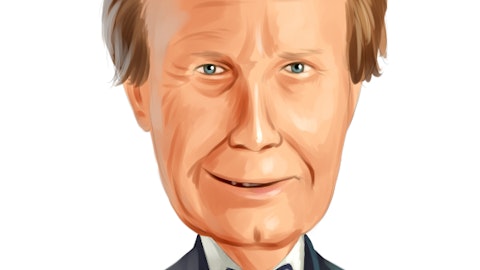This is a great time to be investing in Tesla – but unfortunately from the short side. Of course, there is risk, a lot of risk. So far this year Tesla (TSLA) has risen over 550 percent and many momentum traders predict a continued upward trend. From our perspective at Cornell Capital, however, the stock has already reached “ludicrous speed.” Never a stock that traded on the basis fundamentals, Tesla Inc’s stock has become so divorced from the underlying economics that it now exists in a kind of valuation twilight zone. At a market capitalization of over $550 billion Tesla currently has an equity value greater than that of the entire automobile industry (excluding Tesla) at the start of 2019.

Q3 2020 hedge fund letters, conferences and more
Jump In Tesla’s Stock Price Due To The Inclusion In The S&P 500
The latest jump in Tesla’s stock price was catalyzed by the announcement of its inclusion in the S&P 500. On the news, the stock jump from $489.61 to $583.93 despite slowing sales growth, a falling market share in Europe, and recalls in the United States. Like the earlier announcement of the stock split, which as I documented in an earlier post available from Cornell Capital describing how the stock price ran-up 30 percent, the largely anticipated inclusion in the S&P 500 has had no impact on Tesla’s fundamentals. Nonetheless, in response to the non-fundamental event, the stock rose another 20 percent. In total, Tesla added approximately $250 billion, more than the total market capitalization of all but a handful of American companies, on two announcements that had nothing to do with company’s ability to profitability produce, sell, and service cars.
Tesla’s nearest comparable in terms of market capitalization is Warren Buffett’s Berkshire Hathaway. (Tesla passed Berkshire in terms of market cap on November 27, 2020.) In its last fiscal year Berkshire had revenues of $327 billion and earnings before interest and taxes, EBIT, of $107 billion. In comparison, Tesla had revenue of $25 billion and an EBIT of negative $0.6 billion.
I know what the Tesla fans are saying. Tesla is about the future and Berkshire is about the past. But the fact is that Tesla is almost exclusively an automobile company and the automobile industry remains capital intensive and highly competitive. The reason that Tesla’s market share is dropping in Europe is that competitors are now delivering state of the art electric cars in growing volumes. Furthermore, there has been no dramatic growth in the total number of cars sold. The automobile market is not like the cell phone market prior to the introduction of the iPhone. Yes, there will be a transition from internal combustion engine cars to cars powered by batteries or fuel cells, but the total number of cars sold will still grow at about the rate of the overall economy, if that. To justify its current price, Tesla would have to totally dominate the global car market in the decades ahead and there is scant evidence of that occurring.
The Three Valuation Scenarios For Tesla Inc
Putting aside the general discussion, what happens if you put reasonable numbers into a discounted cash flow valuation model for Tesla Inc? My colleagues Andrew and Shaun at Cornell Capital did exactly that. They produced a video analyzing three valuation scenarios for Tesla Inc: a base case, a bear case, and a bull case. As they explain, the base case, which allows for rapid growth and industry leading operating margins for Tesla, results in an implied stock price of $144.71. Compared to Tesla’s current market price, this represents one of the largest gaps I have ever seen for a major publicly traded company. Even the aggressive bull case with even faster growth and unprecedented margins results in a price of only $301.11 per share, barely more than 50 percent of the market. Finally, the bear case, which is still consistent with a Tesla being a successful automaker, produces an estimated price of only $72.71 per share. In short, the analysis suggests that Tesla is not just overvalued, it is unhinged. In this respect, it is worth noting that if Tesla were to drop all the way to $72.71, its market cap would still be greater than that of General Motors even after GM’s recent runup.
Suppose based on the foregoing you are thinking of shorting Tesla stock, what is the right time? If I could answer that question with any precision, I would be riding out the Covid pandemic on my private yacht. To provide full disclosure, I thought that Tesla was overvalued following the stock split and now it is almost 20 percent higher. But my ambivalence and past errors aside, it is hard not to conclude that now, or just after Tesla officially joins the S&P 500 on December 21, would be a good time to take short position. I took mine last week, but it was small. That ambivalence again.
Suggested Articles:
Disclosure: None.





